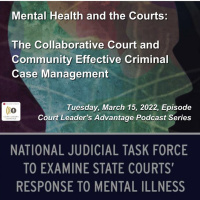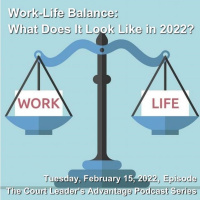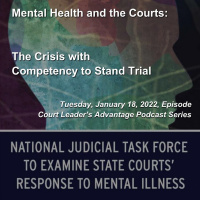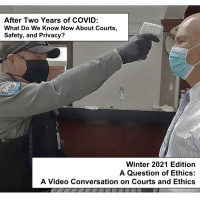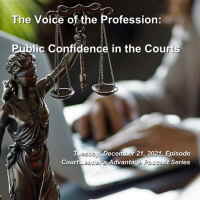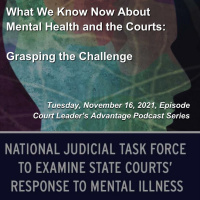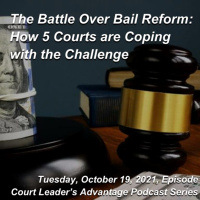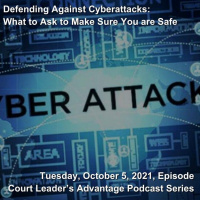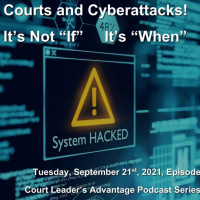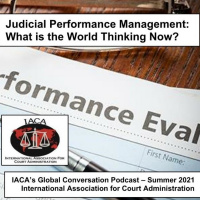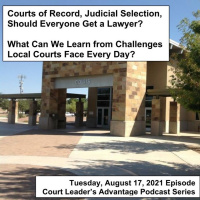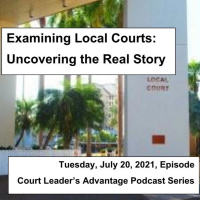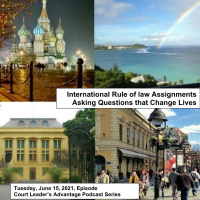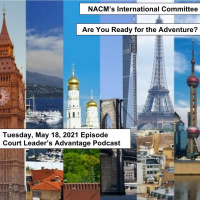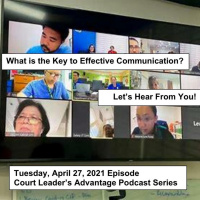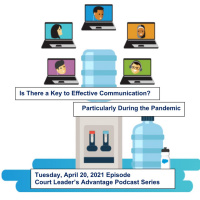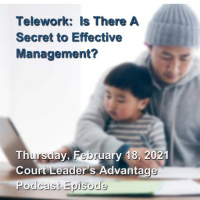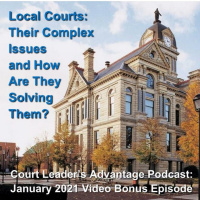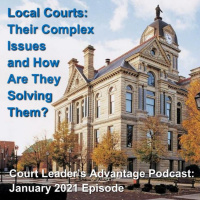Sinopsis
Coming innovations, thought-provoking trends, questions that matter to the court community, these and more themes are covered by the Court Leaders Advantage podcast series, a forum by court professionals for court professionals to share experiences and lessons learned.
Episodios
-
Mental Health and the Courts: The Collaborative Court and Community Effective Criminal Case Management
13/03/2022 Duración: 36minMarch 15th Court Leader’s Advantage Podcast Episode In our last two episodes on mental health and the courts we talked about the fact that traditional criminal case management is not meeting the needs of the people we serve. We must develop a new comprehensive and collaborative model. We need to create a fair and effective caseflow management system that meets the challenges of those with behavioral health needs. There are estimates that up to 70% of the individuals seen in our criminal courts today have behavioral health issues. Currently, state courts do not generally have systems in place to help those with these challenges. This need is made even more urgent with the pandemic and the resulting case backlogs. We must find a new model to strengthen the collaborative court and community response to individuals with behavioral health needs. This month is the third of our five-episode discussion with members of the National Judicial Task Force to Examine State Courts’ Response to Mental Illness. Some of the to
-
Work - Life Balance: What Does It Look Like in 2022?
14/02/2022 Duración: 24minFebruary 15th, 2022 Court Leader’s Advantage Podcast Episode We’ve been talking about work-life balance for decades. It is a perennial challenge. What has changed in these last two years is, of course, COVID. For the first time in the history of America’s court system, large numbers of employees are teleworking, many are frightened of catching the Coronavirus in the office, others are concerned over losing their personal freedom, and we all seem to be working and living with incomplete and often rapidly changing information. Anecdotal comments are both positive and negative. Office productivity has improved; but the lines between work-life and homelife have blurred, particularly for caregivers; management has adapted to the new flexible office; but burnout and mental health concerns have skyrocketed, and this is a contributing factor to what has come to be known as “the great resignation.” This month we are going to explore work-life balance and how COVID has affected courts and court employees. Some of the q
-
Mental Health and the Courts: The Crisis with Competency to Stand Trial
17/01/2022 Duración: 33minTuesday, January 18, 2022, Court Leader’s Advantage Podcast Episode In November we started our discussion on how mental illness is impacting our nation and particularly our courts. In this episode, we are taking a deeper dive into the criminal justice realm, specifically the challenge of competency to stand trial. The task of determining if a defendant is competent to stand trial, to assist in one’s own defense can be daunting. The road to restoring a defendant to competency can be arduous and leave some people in an incarcerated limbo for weeks or even months. This month is the second of our five-episode discussion with members of the National Judicial Task Force to Examine State Courts’ Response to Mental Illness. Some of the questions we will explore include: · What are some of the specific challenges surrounding competency to stand trial? · What is being done to overcome those challenges on both the national and the community level? and · What recommendations does the Task Force have for us? Our panel tod
-
After Two Years of COVID: What Do We Know Now About Courts, Safety, and Privacy? Question of Ethics: A Video Conversation on Courts and Ethics Winter 2021 Edition
24/12/2021 Duración: 38minThese last two turbulent years have brought into sharp relief the dynamic tension between a court’s duty to keep both employees and the public safe, and the duty to respect the privacy and the personal choices of those very same employees and the public. This conversation is taking place at a time when many of us thought (or at least hoped), that these kinds of discussions were behind us. We could move on. Yet, as of December of 2021 the recent appearance of yet another COVID variant has raised a new round of concerns. Three examples suggest points where work life has become increasingly intrusive, yet employees and the public are still at risk. 1) As court offices reopen, some returning employees have refused to disclose their vaccine status. This can put those very same employees as well as others at a higher risk of contracting COVID. 2) As more courthouses open again for staff and the public, some members of the public refuse to disclose their vaccine status and refuse to wear a mask. Security at the fron
-
The Voice of the Profession: Public Confidence in the Courts
20/12/2021 Duración: 23minDecember 21st Court Leader’s Advantage Podcast Episode The preliminary results from NACM’s Voice of the Profession survey have revealed folks' number one issue this year: Public Confidence in the Courts. Over 95% of those responding reported that they either agreed or strongly agreed that NACM needs to advocate on behalf of the courts regarding the public’s confidence in our court system. This result is no surprise. The 2021 National Center for State Courts “State of the Courts” survey conducted this past October reported that public trust and confidence in the courts has sunk to a new low: 64%. A common response to this issue is “we need more public outreach.” If we could just explain what we do and why we did it, the community would immediately embrace the court’s central role in society. This has been disparagingly referred to as the “to know us is to love us” approach. The community may actually know more about the courts than we think and yet remain less than satisfied. Here are three examples of why the
-
What We Know Now About Mental Health and the Courts: Grasping the Challenge
15/11/2021 Duración: 43minNovember 16th Court Leader’s Advantage Podcast Episode The challenge of mental illness is impacting America nationwide. It impacts our states, our communities, our courts, and our entire justice system. The courts are at the center of the clash between competing funding choices, community concerns, and those struggling with behavioral health issues. Local jails and detention centers are the largest providers of mental health services in the country. That’s for both adults and children. In 44 states a jail or prison holds more mentally ill individuals than the state’s largest psychiatric hospital. On the other hand, nearly 30 percent of all family homicides involve a mentally ill individual. This month is the first of five episodes. They will be spread out over the coming winter and spring discussing the National Judicial Task Force to Examine State Courts’ Response to Mental Illness. Some of the questions we will explore include: · What do we know now about mental health, incarceration, and the courts?
-
The Battle Over Bail Reform: How 5 Courts are Coping with the Challenge
18/10/2021 Duración: 36minTuesday, October 19, 2021, Court Leader’s Advantage Podcast Episode The national movement to reduce or eliminate cash bail continues to spark heated discussion. Several states, including New Jersey and Alaska, have instituted bail reform. Other states such as California have repeatedly seen attempts at reform fail, either in the legislature or at the ballot box. Proponents argue that bail criminalize poverty. Bail doesn’t keep the most dangerous in jail, it keeps the poorest. Opponents point to reported instances where bail reform was followed by an uptick in crime. This month we are looking at the ongoing debate over bail reform and the pivotal role that courts play in this discussion. Some of the questions we will explore include: · What are courts doing now about bail reform? · What role does generating revenue have in the debate over bail? · How do risk assessment algorithms play into this discussion? · What advice do our panelists have for the rest of us regarding courts and bail reform? Our panel today
-
Defending Against Cyberattacks! What to Ask to Make Sure You are Safe
04/10/2021 Duración: 35minTuesday, October 5, 2021, Court Leader’s Advantage Podcast Episode A cyberattack is truly a different kind of threat, but that threat is real and growing. It takes a different kind of approach to defend against such an attack. Different questions need to be asked well before an attack occurs. Cybersecurity experts advise that having responses to these questions is essential to effectively preparing for and responding to an attack. In this episode we are talking to several court professionals who have endured a cyberattack on their court. We will be exploring questions on how to prepare your court to defend against an attack: · What questions do you need to ask your IT professionals? · How do you convince a funding body to spend the needed resources on cybersecurity? · Do you have a realistic plan to conduct court business without your case management system or even computers for weeks possibly even months? · How can you effectively train staff to respond to a cyberattack? · Does your Continuity of Operations
-
Courts and Cyberattacks! It’s Not “If” – It’s “When”
20/09/2021 Duración: 36minTuesday, September 21, 2021, Court Leader’s Advantage Podcast Episode Threats from cyberattacks can be easily ignored by courts. There are many rationalizations: “Our court is too small to worry about cyberattacks” “We have a great firewall that keeps everything out” “Our employees change their passwords every three months just like clockwork” “Everyone has been told not to open suspicious email attachments” Often the perspective can be “We’re good” You are good until the morning you fire up your desktop only to find a black screen with the words “pay $50,000 in bitcoin and we will send you the codes to unlock your case management system.” Cyber-experts continue to advise that it isn’t a matter of “if,” it is a matter of “when.” In this episode we are talking to court professionals, several of whom have suffered through a cyberattack in their court. We’ll be exploring questions including: · How did the court respond to the cyberattack? · What could management have done differently? · What could they have done
-
Judicial Performance Management: What is the World Thinking Now?
17/09/2021 Duración: 38minIACA’s Global Conversation Podcast Summer 2021 Measuring judicial performance is a burning topic in many countries around the globe. How to balance the need for timely case resolution with the necessity for just results is a question many court experts have often pondered. Today, our panel of international court professionals will discuss the implications of measuring judicial performance. This episode delves into a number of questions surrounding measuring judicial performance: · How do you use the performance measures? · Who gets to see the data? · What effects does automating judicial performance measurement have? · Do you tie judicial performance to an overall strategic plan? · What advice do these court professionals have for the rest of us? Our panel today Includes: Angéline Rutazana: Inspector General for the Judiciary of Rwanda Niceson Karungi: E-Justice Expert with Synergy International Systems Dr. Aseel Zimmo: Advisor to the Chief Justice and Minister of Justice, Bahrain Thomas G. Bruton: Clerk of C
-
Courts of Record, Judicial Selection, Should Everyone Get a Lawyer? What Can We Learn from Challenges Local Courts Face Every Day?
16/08/2021 Duración: 33minTuesday, August 17, 2021, Court Leader’s Advantage Podcast Episode Local Courts can offer incredible opportunity for both defendants and for the community. They are positioned precisely at a point to curtail dangerous behavior before it grows worse. The array of problem-solving courts nationally, often managed on a shoestring budget, is astounding. This does not make up for the fact that local courts are often neglected. They are frequently disparaged. In some cases, they manifest structural flaws that clearly need to be corrected. All the while, we remember that local courts are the place where most of the public obtain their first-hand experience of courts and justice. This month we look at some of the challenges local courts face including: · How should local court judges be selected? · Should all local court judges be attorneys? · Should all defendants in matters before local courts be represented by counsel? · Should local courts be courts of record? We will also continue our discussion of three recent H
-
Examining Local Courts: Uncovering the Real Story
19/07/2021 Duración: 34minTuesday, July 20, 2021, Court Leader’s Advantage Podcast Episode Local Courts are the least analyzed components of the American court system. This is particularly ironic since there are thousands of local courts, far more than there are courts of general jurisdiction. It has been estimated that they process over three and a half million criminal cases and collect at least two billion dollars in fines and fees annually. When we talk about preserving the public’s trust and confidence in America’s courts, we often miss that most citizens gain their first-hand experience from dealing with a local court. This month we are looking at three recent Harvard Law Review articles on local courts: Criminal Municipal Courts by Alexandra Natapoff, Kangaroo Courts by Shaun Ossei-Owusu, and Abolish Municipal Courts by Brendan Roediger. Here to discuss their perspectives on these articles are folks who can honestly reveal the whole story on local courts. They are judges and court administrators all of whom work in municipal co
-
International Rule of Law Assignments: Asking Questions that Change Lives
14/06/2021 Duración: 31minTuesday, June 15, 2021, Court Leader’s Advantage Podcast Episode Long days of travel, strange hotels, and strange food. Yes, international assignments can include all of these. But it can also afford the opportunity to make real change and create real change in yourself. This month we are talking to folks who have engaged in international rule of law assignments in countries around the world. We’re asking questions about international assignments. Did the folks on assignment make a difference? What were the political and cultural hurdles these people had to overcome? Do you need to know the language to go on assignment? What takeaways do these folks have for the rest of us? Today’s contributors: · Michele Oken, is a past president of NACM and has chaired the International Committee for the past seven years. In March of 2020, she retired from the Los Angeles Superior Court where she worked as a manager and court administrator for approximately 19 years. · Jeffrey Apperson is Vice President of the National Cent
-
NACM’s International Committee: Are You Ready for the Adventure?
17/05/2021 Duración: 43minTuesday, May 18, 2021 Court Leader’s Advantage Podcast Episode International work can be challenging. It can also be very rewarding. No matter what, it is an adventure you will remember for the rest of your life. Have you thought about it? Wondered if it was for you? Where would you even go to get answers to your questions? This month we are talking to folks who have served as consultants on rule of law assignments in countries across the globe. From Russia, to Vietnam, to the Pacific Islands, these panelists have seen it all. Now you will hear their stories first-hand. This episode will give you a taste of international work. We will also tell you about NACM’s own forum for people involved in international work and for those wanting to get involved: The NACM International Committee. In addition, you will learn about the National Center for State Court’s International Division and the outstanding work it is doing around the globe. Today's Contributors Michele Oken is a past president of NACM and has chaired t
-
What Is the Key to Effective Communication? Let’s Hear from You!
25/04/2021 Duración: 28minTuesday, April 27, 2021 Court Leader’s Advantage Podcast Episode This week we are continuing our April 20th conversation with our panel on what is the key to effective communication, particularly during the pandemic. This week our panel covers topics including rumors and misinformation, the importance of “virtual water cooler” time, and the challenge of delivering unwelcome news. You will remember that we asked you viewers to send in your thoughts on what was the key to effective communication. We received some great ideas, so we asked several folks to give us their advice on what makes for effective communication during the pandemic. Today’s Contributors: These are folks who sent in advice on what is the key to effective communication: · LaShawn Thompson, Court Administrator for Oklahoma City Municipal Court · Joshua Larsen, Trial Court Supervisor, Dubuque, Iowa · Stacy Worby, Jury Coordinator for the Alaska Court System Today's Co-Host: Alyce Roberts with the Alaska Court System. Today's Panel: · Zenell Bro
-
Is There a Key to Effective Communication? Particularly During the Pandemic
19/04/2021 Duración: 28minTuesday, April 20, 2021 Court Leader’s Advantage Podcast Episode It seems that at some point in every class the facilitator utters those words, “communication is key.” We all know however, that communication must be effective to make a difference. So, what is the key to making communication effective? In this episode, we are going to explore communication. How to make it count. How to avoid wasting time for you and your employees. Specifically, we will look at: · How effective has court communication been during the pandemic? · Are there different approaches to effectively communicating with employees, with other justice stakeholders, and with the general public? · How can you obtain employee feedback in the age of Zoom meetings? · What can we learn from our panel of court administrators? About Our Presenters Our Co-Host Alyce Roberts is recently retired as the Special Projects Coordinator for the Alaska Court System. As a member of the court’s senior staff, she was the AOC’s primary liaison with the clerks o
-
What You Need to Know About Juvenile Detention and Placement Decision-Making and COVID
15/03/2021 Duración: 42minTuesday, March 16, 2021, Court Leader’s Advantage Podcast Episode The Coronavirus has created a crisis in America’s jails and prisons. Many of these facilities have become COVID hotspots. Although sometimes overlooked, the pandemic also poses an enormous risk for juveniles who are detained. It is surprising to learn that, according to the Annie E. Casey Foundation, there were actually more young people in detention in December of last year than in April when the pandemic was new. And a greater proportion of those young people were Black and Latino. To investigate this alarming situation, Drexel University and the National Council of Juvenile and Family Court Judges have come together in a new project to 1) research juvenile risk assessment, risk reduction, and judicial decision-making during the pandemic; 2) develop a research-based plan to safely lower the numbers of young people confined in juvenile facilities; and 3) use that plan to motivate decision-makers to safely reduce the number of confinements, and
-
Telework: Is There A Secret to Effective Management?
17/02/2021 Duración: 40minThursday, February 18, 2021, Court Leader’s Advantage Podcast Episode Back in October of 2019, for most courts, working remotely from home was a privilege granted to a small number of court employees. It seemed to be granted mostly to Court Technology workers and Executive Office staff who were working on some major project. Who would have thought that just six months later, courts across the country would be engaged in promoting telework to many if not most of their employees? This has been a profound cultural shift that is almost unheard of in court administration. We now have close to a year’s experience with allowing telework on a widespread basis. · What has been the experience of court administrators and clerks of court with telework? · What productivity improvements have we seen? · What are the obstacles that we have encountered and how have we steered around them? · What lessons have we learned and what advice do we have to share? We are talking with court administrators from around the country about
-
Local Courts: Their Complex Issues and How Are They Solving Them?
27/01/2021 Duración: 15minThursday, January 28, 2021, Court Leader’s Advantage Podcast Bonus Episode Welcome to a bonus episode on how local courts are facing and solving their many complex issues. As mentioned in last week’s episode, these local suburban and rural jurisdictions are very often the representative of the judicial branch in much of America. We are continuing our conversation with clerks of court and court administrators from one and two judge courts around the country. We are chatting about the current issues facing local courts including automated case management systems, teleconferencing, telework, and training in smaller jurisdictions. How are these courts managing those issues, and what advice they have for the rest of us? About Our Speaker Panelists Angie Van Schoick is the Court Administrator for the Municipal Court in the Town of Breckenridge, Colorado. It is a position she has held since 2013. Angie is a licensed macro level social worker in the State of Colorado and Michigan, receiving her MSW from t
-
Local Courts: Their Complex Issues And How Are They Solving Them?
20/01/2021 Duración: 33minCourt Leader’s Advantage Podcast: January 2021 Episode When we talk about the challenges confronting America’s judicial branch, we often focus on the concerns and accomplishments of large metropolitan courts. After all, they are often the ones that have more money and more resources to throw at a problem. However, a survey conducted several years ago, revealed that almost 65% of all courts in the United States had benches of fewer than four judges. In a large portion of our country, these local suburban and often rural jurisdictions, these local courts are the representative of the judicial branch. How are these local courts solving their problems? How are they coping with the issues of the day with less staff, less money, often shared facilities, and frequently government entities that are somewhat less respectful of the court as being a separate branch of government? This month we have invited clerks of court and court administrators of one and two judge courts around the country to chat about t

